Reading list: The best from the West
Here’s the list we put together with recommendations from staff and NCPR friends and listeners. Please add your recommendations in the comment section–or tell us why you like or don’t like titles listed here.
John Ernst, NCPR book show co-host (and student of the American West)
A River Runs Through It and other stories, Norman MacLean (1976). A River Runs Through It is the gemstone of this collection of three stories. It begins with the classic opening, “In our family there was no clear line between religion and fly fishing.” It is a Montana story, set on and around the Big Blackfoot River. It is about the narrator’s Presbyterian minister father, about his disgrace of a brother-in-law, and most all about his troubled brother, Paul, a brilliant fly fisherman.
All the stories are Western stories. As one publisher wrote disparagingly in returning them to the author, “These stories have trees in them.” Two of the stories are about the early days in lumber camps working for the forest service and for mining companies. The details of the camps and the talk and the men are perceptively observed and authentic. In these stories you will learn the art of packing a load on a mule. You will learn the difference between “general” and “special” flies. You will learn why you always have to shoot a mountain sheep from above.
Maclean is a rare writer. His prose has a special clarity and an ironic tang that reminds me of Ring Lardner. His sentences are as sharp as a rifle shot, or like a perfect four-count fly cast. To say that this is a collection of short stories is about as meaningful as saying the Bible is a book about religion.
Angle of Repose, Wallace Stegner (1971). Also: The Big Rock Candy Mountain and Crossing to Safety
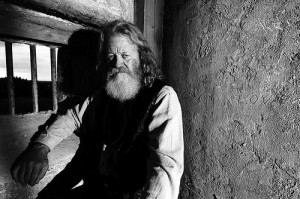
Cowboy #2. Photo: Randy Pertiet.
This 1971 novel won a Pulitzer for Wallace Stegner. It is a sweeping narrative of the opening of the West, framed by the narrator, a historian named Lyman Ward, who is recovering from the loss of a leg and a recent divorce, living in his grandparent’s large California house in Grass Valley and attempting to reconstruct the stories of his grandmother, a remarkable artist/writer and his engineer grandfather. Lyman’s grandmother, Susan Ward, is a striking character–bold, smart, snobbish, charismatic, talented. She abandons the sophisticated parlors of the East for grubby, dusty mining towns in the west, where her husband tries to scratch out a living as an engineer.
The story follows the long marriage of these two not always compatible people, broken in its middle years by tragedy and betrayal but continuing for 40 years, the last of them lived in the very house in which the narrator is forced to confront the betrayal that destroyed his own marriage.
Spider Woman’s Daughter, Anne Hillerman (2013) Also by Tony Hillerman, her father, The Blessing Way, A Thief of Time, The Skin Walkers and 16 other novels as well as non-fiction work about the west
For the many fans of Tony Hillerman’s novels featuring Navajo Tribal Policemen Joe Leaphorn and Jim Chee there is very good news. Although Hillerman died several years ago, his daughter, Anne, has taken up where he left off and revived Leaphorn and Chee, as well as fellow officer Bernadette Manuelito, in a brand new mystery that crackles with life. Tony Hillerman published his first Leaphorn novel, The Blessing Way, more than forty years ago. I have read all 19 novels he published since then and I am not the only one.
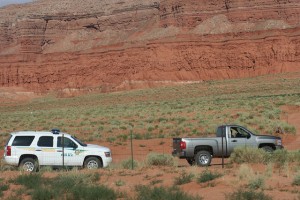
Navaho police out in force. Photo: Quinn Dombrowski.
In this novel his daughter circles back to a 1988 novel, A Thief in Time, and picks up characters and a plot thread from that story. The transition is seamless and Anne captures the tone and feeling of the earlier books, lingering over descriptions of the reservation landscape, traditions and even weather. The pleasure in these books is the getting there, not the outcome. The pace is gentle, not driving, with complications of plot that spin out, wind back on themselves, and gradually resolve. A special bonus here is Anne’s development of Bernie Manuelito into a front line character. I can’t wait for the next installment.
The Last Outlaws: The Lives and Legends of Butch Cassidy and the Sundance Kid, Thom Hatch (2013). Also, Black Kettle, Osceola and the Great Seminole War, The Custer Companion
Thom Hatch is a winner of a Spur Award for best biography, given by the Western Writers of America. here he introduces Robert Leroy Parker born on a Friday the 13th in 1866 to devout Mormon parents in Circle Valley, Utah and later known as Butch Cassidy. And, born a year later in a small town in Pennsylvania, Harry Longabaugh, later to be known as the Sundance Kid.
Hatch follows the two young men through early careers working ranches and doing a little rustling on the side to the eventual formation of The Wild Bunch–a determined band of bank robbers and railroad hijackers that Butch and Sundance bossed. They had a good run but then the Pinkerton Detective Agency began to close in and telegraph communication made the life of a desperado that much tougher. Butch and Sundance went straight for a while, punching cows and working for a mining operation, finally moving to South America with Sundance’s mysterious common law wife, Etta Place. But even in a remote part of Bolivia their pursuers followed, and they were killed in a shootout after a payroll robbery in 1908.
Hatch does a good job of separating the haze of the 1970 movie version with Robert Redford and Paul Newman from the historical facts. Their legend is so strong that there were many reports from family members and associates of their reappearance as late as the 1930s. This is a clear-eyed view of the old West as it really was, without the glow of fiction.
The Way West, A.B. Guthrie, Jr. (1949) Also: The Big Sky
I had read The Big Sky years ago but never read The Way West–which seemed essential for a West-themed program. This is a big, slow-moving, lumbering Conestoga wagon of a novel. It is very much a product of the post-World War II era, fueled by patriotism, Manifest Destiny and religious fervor.
It is, of course, the story of one wagon train–its formation and its journey from Independence, Missouri to Willamette, Oregon in 1845 across desert and mountain and surging rivers–besieged by disease and rattlesnakes and sometimes Indians. All the classic figures of Western folklore are here–Evans, the restless and able but overly-modest pioneer who becomes a leader; Dick Summers, the old Mountain Man who guides the party through every peril with stoicism and quiet wisdom; the heroic women, uncomplaining and dutiful; and even the snarling, cowardly villain, McBee.
The story has an undoubted power that grows as the party is tested and character is revealed. A dark stain of racism in the attitude toward Native people mars the book–perhaps a reflection of another time. But this Pulitzer-winner is a piece with the legend of an expanding America and has something moving to say about it.
The Searchers, Alan Le May (1954)
The Searchers begins with a man taking his shotgun for a last look around his house at sundown, wary of an Indian attack. It is the late 1850s in the Cross Timber Country of Texas — land dominated by Comanches for centuries. A covey of quail start up and the man rushes for the house to protect his family. In the attack that follows the entire family, everyone but an 11 year old girl, is killed. She is taken captive. For the next five years her uncle and her foster brother search for her over the length and breadth of Comancheria. The two men have very different motives and in the end a clash is inevitable. When they find Debbie Edwards, she is no longer a child and she is well along toward being a Comanche.
I haven’t read this novel since I was 15 years old, and I had forgotten how good a writer Le May is. The story moves at a deliberate and measured pace, like a Greek tragedy. The style is appropriate to the subject. A dawn is described as, “cheerless as a drunkard’s awakening.” Debbie, with her “kitty-cat face and green eyes,” becomes a constant presence in the novel although she doesn’t actually appear in it until the end. Of the motivation of her foster brother, Martin, Le May writes, “hope had led him on, dancing down the prairie like a fox fire, always just ahead.” I found the novel absolutely riveting from the first page to the last and resented any interruption until I had finished it.
The Searchers: The Making of an American Legend, Glenn Frankel (2013) Also: Beyond the Promised Land, Rivonia’s Children
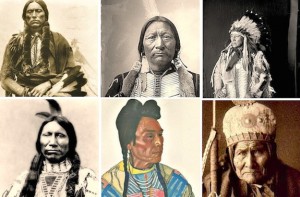
The six chiefs who rode in Theodore Roosevelt’s inaugural parade. Comanche Quannah Parker is in upper left corner. Photo: Smithsonian.
Glenn Frankel wrote for the Washington Post for 27 years and won a Pulitzer for his Middle East reporting. In this book he has taken on a fascinating multi-level narrative and handled it brilliantly. One thread of the story is the 1836 Comanche raid in East Texas that resulted int he kidnapping of 9-year-old Cynthia Ann Parker, who lived with the Comanches for the next 23 years, married her captor and had three children by him, one of whom, Quannah Parker, became the last major Comanche chief and eventually led the tribe toward assimilation in Oklahoma.
Another strand of the story involves Alan Le May, the pulp magazine writer, screenwriter, and novelist who wrote The Searchers, published in 1953, based on the Parker story and told from the point of view of her uncle who searches for her for years with unhappy results.
Then there is the story of John Ford, the alcoholic and abusive but brilliant film director (he slugged Henry Fonda on his previous film). Ford returned to Monument Valley, the iconic setting for many of his films, and engaged John Wayne to star in The Searchers, a powerful film that vibrates with moral ambiguity. Receiving mixed reviews on release in 1956, it has been championed by Spielberg, Scorsese and George Lucas and rated the 7th greatest film of all time by the British Film Institute.
Frenkel traces each story line to its conclusion, probing the difficult relationship between Ford and Wayne on set, even attending family reunions held by the Texas Parkers and the Comanche Parkers. His tracing of myths of the West as they developed, version by version, through contemporary accounts, history, fiction and film is alone worth the price of admission. This is a masterful piece of research and writing.
Young Men and Fire: The True Story of the Mann Gulch Fire, Norman Maclean (1992)
One more from Maclean…after last summer’s news stories about the fires in the West, including the Rimfire threatening Yosemite Park and even San Francisco, it may be well to revisit Norman Maclean’s brilliant study of the August, 1949 Mann Gulch fire that claimed the lives of 13 young Smokejumpers.
This is the story of a fire that turned into that most feared thing–a blowup in which a blaze explodes like a storm. It is the story of young men, some still in their teens, who jumped from planes to fight fires. It is the story of the Forest Service, where Maclean worked shortly after its formation in the aftermath of the terrible fire summer of 1910. And it is a story with a mystery at its heart. Why did most of the doomed crew ignore the instructions of their experienced team leader to enter the ashes of a fire he set to save their lives– or did that cross fire actually lead to their deaths.
Maclean spent 14 years obsessively researching the Mann Gulch disaster in libraries, conference rooms, and back at the scene years later with two of the survivors, painfully clinging to bunchgrass on a steep rise in brutal heat. It is for him a very personal engagement with the event and the people involved. He is both the investigator and the investigated. He takes the story apart again and again, examines the pieces, and re-assembles them. In the end it is his story as much as it is that of the victims and their families. And it is a story of great power and majesty, wrenching and dramatic.
Chris Robinson, NCPR book show co-host, Clarkson Liberal Studies professor
(Note: Chris wandered into the studio to join the conversation and brought these contributions to the conversation.)
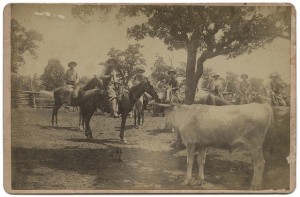
Cowboys on horseback with cattle, circa 1915. SMU Central University, no known restrictions.
Lonesome Dove, Larry McMurtry
Border Trilogy and Blood Meridian, Cormac McCarthy
Shane, Jack Schaefer
Plus work by Tom McGuane, Jim Harrison, Annie Proulx, Harry Paige, Craig Johnson
And, Chris turned us all onto the SPUR Awards for the best of western writing, presented by the Western Writers of America. Some great titles to be mined here.
Okay, before we go to my picks and lots of recommendations from our community, check out this cool video of a cowboy pop-up book:
Ellen Rocco, NCPR station manager, call-in co-host
Just want to say it was really hard to narrow this down, so I just opted for the titles that came to mind most immediately. There’s an amazing body of work set in the American west.
The Son, Philipp Meyer. The underbelly of Texas history, told through the saga of one powerful Lone Star family.
The Border Trilogy: All the Pretty Horses, The Crossing, Cities of the Plain, Cormac McCarthy. Or, anything else by McCarthy. I first discovered him through his early novel, Suttree. When I read The Road (cover to cover on a 14-hour flight to Japan), I couldn’t help but flash on the wide open Texas badlands as the inspiration for McCarthy’s post-apocalyptic landscape.
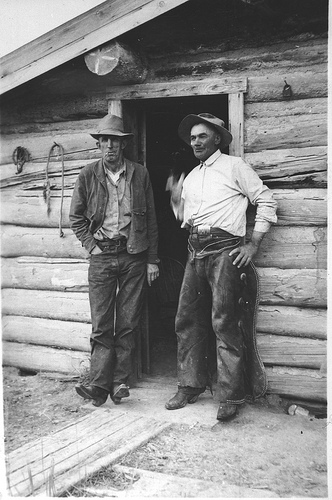
Cowboys Bill Marshal and Guz Conforth on the Upper Ruby (1952). Photo: Montana State University
Close Range: Wyoming Stories, Annie Proulx. I first fell in love with Proulx’s writing through The Shipping News, her novel set in the Canadian maritime provinces. It wasn’t until later that I learned she splits her time–and scene setting–between those oceanic northern landscapes and the American west.
Anything by Tony Hillerman. I lost count of how many of his Leaphorn and/or Chee mysteries I’ve read. Each one has the capacity to place me in the dry washes and deserts of the Southwest–even if it’s January in the North Country. Hillerman cares as much about giving us a sense of the world inhabited by the Navaho people as he does about stirring up a great whodunit from the artifacts and traditions of those people.
Angle of Repose, Wallace Stegner. Another author whose life was split between the northeast and the west. I read Stegner with total trust: I know the language and the story will sing, and the song will touch my heart.
Oh, and everything by Jim Harrison (best known for Legends of the Fall). And, Sherman Alexie. And so many others…
From NCPR staff, online and listening friends:
Claudia MacDonald:
When I lived in Colorado (prior to Canton) I was introduced to so many fine writers of the American West…so many I’d previously never heard of. Denver had an annual book show lasting a couple or three days (it grew smaller over time) featuring panel discussions and individual presentations. Steamboat Springs did the same. A virtual book-lovers paradise! This is where I first heard Barbara Kingsolver, Terry Tempest Williams, Sherman Alexie, Wallace Stegner, Linda Haselstrom, Jake Page, Jimmy Bacca, James Galvin, Ivan Doig, James Welch, Sharman Apt Russell, Mary Clearman Blew, Leslie Marmon Silko, Stanley Crawford, Annie Proulx, Gretel Erhlich, Louise Erdrich, and so many more. One panel viviidly in my mind: Clarissa Pinkola Estes and Chief Wilma Mankiller. During another presentation, Sherman Alexie yelled at a white woman with blonde hair who was all decked out in ‘Indian’ gear: “Get out! You are not an Indian!” I’m sorry I can’t participate in this show but I have a prior commitment during this time. I will listen to it later (and so glad capabilities exist for me to do so). Have fun!
Phil Friden: Angle of Repose, Wallace Stegner.
Helene Vanderburgh: My favorite is Wallace Stegner.
Bridget Meyer: First and foremost, Edward Abbey. For “fun” read the CJ Box Joe Pickett series. He illustrates life in the western wild places from the vantage point of Joe, a Wyoming game warden. Lots of mystery and intrigue as well!
Rob Sproegell: How about a book that I plan to read– The Place of Dead Roads by William S. Borroughs.
Danielle Maguire: Thought Edward Abbey might be worth mentioning…Desert Solitaire and The Fools Progress are my favorites.
Eileen: Ed Abbey, Sherman Alexis, Will Cather, Wallace Stegner, Dee Brown, Doug Peacock, Teddy Roosevelt, Delores LaChapelle.
CJ says: Check out The Virgil Cole/Everett Hitch westerns by Robert B. Parker of Spencer and Jesse Stone fame.
Mr. Waikiki: I know it is the ‘new west’ of sorts Thomas McGuane.
Dave Staszak, Saranac Lake: Beyond the Hundredth Meridian, Wallace Stegner. Best book about the west. Using John Wesley Powell as a take off point he really explains the history and future of the west.
Anonymous, Piercefield:
I listened to the book recommendation show today and was prompted to write my reaction about a book I just couldn’t finish (years ago) because I thought it lost its soul amid the detail. The MacLean book about the Mann Gulch Fire. I usually try to read the book award nomination list, especially for non-fiction because they usually get so little press like the fiction blockbusters. My God, 20 yrs ago and I still remember my reactions! Maybe I’ll go back and try to re-read (or rather try to get through it) it but your reviewers weren’t encouraging. Too many books, so little time (and eyesight now.) After all there are alternatives — definitely better. Widmark’s 1952 film, Red Skies of Montana, isn’t great but its servicable. Better yet are the songs — maybe just the poetic compression of events and words gets the big picture in better focus than 10000+ words. Give a look/listed to a song you may have heard: Cold Missouri Waters (written by Keelaghan, a Canadian folksinger) but better done by Cry, Cry Cry — my favorite, maybe even a desert island song. Youtube has a few versions. I like this video mix: http://youtu.be/KgQNeGPJdcQ (Cry Cry Cry) but it could just be my Dar Williams thing. A Keelaghan version is a little rougher but I think I’ve heard a studio version of his which is a tad better. http://youtu.be/qomNoN7MCYg.
SESZOO:
Well Howdy and bring me on back to childhood .. Thanks Ellen for bringing this forgotten time back into the light , When I was young my father gave me a small collection of old westerns that were his when he was a kid ,I believe they were from the ’30s, which I have in turn some few years back gave to my son. They were a fun read and I believe they set the stage for the Hardy Boys and Nancy Drew mysteries, though I’m not sure. They were called the X Bar X Boys and they were always having adventures in the old West, getting into jams and solving many a mystery and catching the evil doers in the end. All around good guys. They were written by a James Ferris and were a fun read for kids books. I’m not sure how many were written and I haven’t thought of them now in years as I did pass them along, but they did bring back a flood of memories of simpler and better times. Don’t believe as many kids read and get into books the way we did before all the media that’s available today. Thanks again for the kick back to 45 to 50 years ago.
Cindy Randi: I just thought of an author we have been reading for many years. CJ Box writes mysteries about the west; many feature Joe Pickett, a fish and game employee. CJ started out writing for the little newspaper in Saratoga, Wyoming where we lived for many years. Very fun reads!
Captain Dan from Vermont: Vermonter Frank Howard Mosher’s 2003 book: The True Account: A Novel of the Lewis & Clark and Kinnison Expeditions. A riot! A hilarious understanding of what did and didn’t go on as the west was won.
Virginia Siskavich: I feel compelled to suggest Jim Harrison for this list. Harrison is best known for his novella Legends of the Fall (remember that movie with Brad Pitt?) but he is a wonderful author, poet, and champion for nature (especially Midwestern themes!) and a rustic, pioneering and sensual life. I have seen and read many interviews with Harrison and cannot get his face and voice out of my head when I read his books — he is a gritty man, never without a cigarette, who enjoys good food and good booze. Mr. Harrison is larger than life and his work is not to be missed.
Christopher Shaw, Saranac Lake area and Vermont: Son of the Morning Star: Custer and the Little Bighorn, Evan S. Connell. Also, I consider Cormac McCarthy the best fictional nature writer. Also, movie versions of both Legend of the Fall and A River Runs Through It are grotequely melodramatic whereas their literary sources never are.
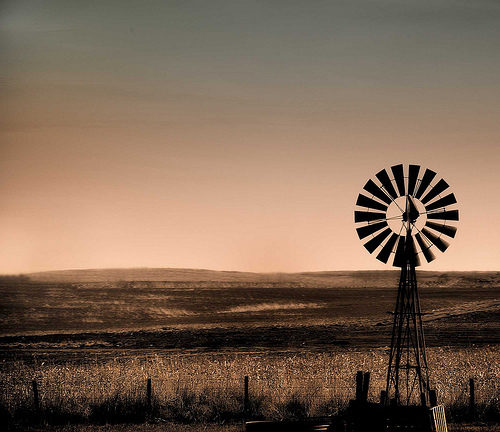
The big country. Photo: Marsmetnn Tallahassee.
Jason: Lonesome Dove and Streets of Laredo, Larry McMurtry.
Mitch, Raquette Lake: Jack London short stories, including “All Gold Canyon.”
Dave, Burlington: The Travels of Jaimie McPheeters, Robert Lewis Taylor.
Michael, Chestertown: A Lady’s Life in the Rocky Mountains, Isabella Bird.
Pamela, Colchester: The Walt Longmire mysteries by Craig Johnson.
Mike: Desert Solitaire, Edward Abbey.
Carol, Lake Placid: Bury My Heart at Wounded Knee, Dee Brown.
Anonymous caller: This House of Sky, Ivan Doig.
Bombay Duck Pickle: My Antonia, Willa Cather.
Chris Morris, NCPR news stringer: The Sisters Brothers by Patrick DeWitt is awesome. You can’t go wrong with No Country for Old Men.
Bill Haenel, NCPR web developer:
I read a western called Circuit Rider by Dani Amore, an author I’d never heard of, as a serial via Kindle Serials a few months back. (Western serial? Who would imagine such a thing?) It was an okay book. It kept me entertained. Easily the most interesting feature was the choice of a hero/heroine pair, a preacher and a drunk gunfighter, the gunfighter being the heroine. There were other elements that were unusual for a western, including a serial killer and a lot of pentagrams. It was certainly different than any other western genre book I’d read before, and yet strangely familiar in its style, applying the typical western over-masculine characteristics and behaviors of a western hero to a woman, with softer, more stereotypically feminine/sensitive features to the hero preacher. Deliberately flipped, I guess. Anyway, it wasn’t the best read ever, but it was fun and I finished it, which is something of a positive vote I guess.
Lucy Martin, Ontario-based NCPR news stringer and blogger:
Back in high school I was quite taken with The Cowboy and the Cossack by Clair Huffaker, which seems to be liked by others as well. Here’s the blurb from Goodreads: “On a cold spring day in 1880, fifteen American cowboys sail into Vladivostock with a herd of 500 cattle for delivery to a famine stricken town deep in Siberia. Assigned to accompany them is a band of Cossacks, Russia’s elite horsemen and warriors. From the first day, distrust between the two groups disrupts the cattle drive. But as they overcome hardships and trials along the trail, a deep understanding and mutual respect develops between the men in both groups.” Who says Yanks and Russians can’t be pals?
Keep those suggestions coming. Post below in the comment section.
Interested in cowboy songs, anecdotes, trash talk, stories and humor? The Smithsonian is a great source of articles, recordings and much more. Here’s a link to an album of cowboy music and talk.
Tags: reading list





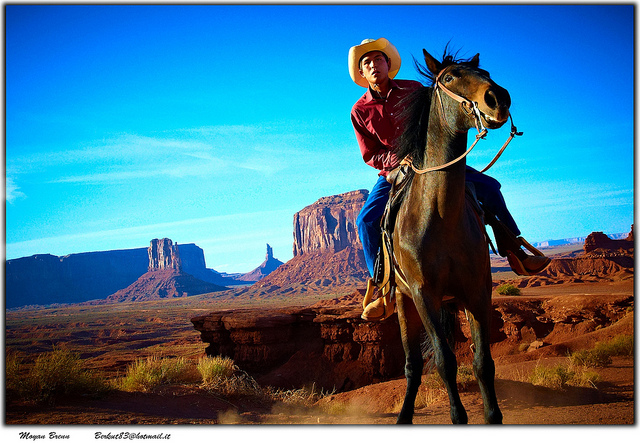
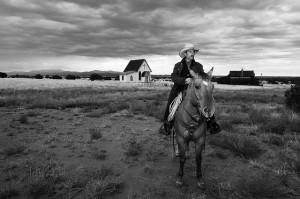



I would add, if no one else has, Blood and Thunder by Hampton Sides (c 2006), a new biography of Kit Carson. Covering his life, more or less, spans the discovery and development of the West. It is a great read as his path crosses many other figures of this time period.
Ken Kesey’s great novel “Sometimes a Great Notion” was set on the west coast but “Last Go Round” was set in Pendleton, OR, a much more “western” venue. Not his best work, but still a good read.
I really liked these stories…… “Flight and Other Stories” by Jose Skinner. Published by the Univ. of Nevada Press.
I second Anonymous’ recommendation of” This House of Sky” by Ivan Doig — a most touching memoir of growing up in Montana with primarily one parent, remembering little of his mother’s voice but everything about her asthmatic last breaths. Suggest also reading any of Doig’s novels, especially his recent “The Bartender’s Tale” in which you will hear echoes of This House of Sky. His descriptions of Montana are both true to fact and lyrical.
Also want to suggest any and all of Gretel Ehrlich’s work from one state south, especially “A Match to the Heart” about her long recovery from a direct lightening strike and her first novel, “Heart Mountain,” set in a Japanese-American relocation camp in Wyoming.